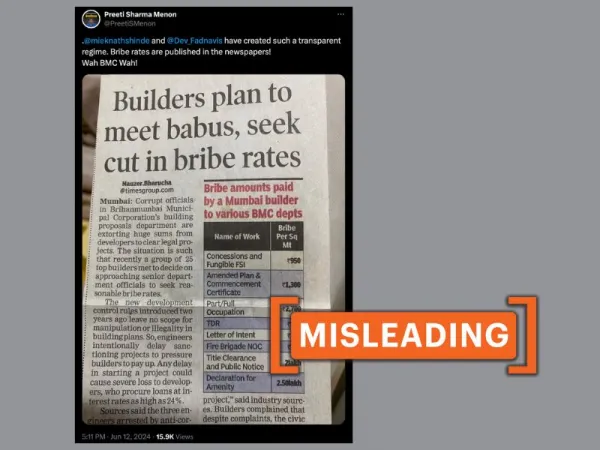By: Soham Shah
June 14 2024
 A post shared with a 2014 Times of India report blaming Eknath Shinde and Devendra Fadnavis. (Source:@PreetiSMenon/X/Modified by Logically Facts)
A post shared with a 2014 Times of India report blaming Eknath Shinde and Devendra Fadnavis. (Source:@PreetiSMenon/X/Modified by Logically Facts)
This news report by The Times of India was published in 2014, before Devendra Fadnavis or Eknath Shinde came to power in Maharashtra.
What is the claim?
Multiple accounts on social media associated with the Aam Aadmi Party (AAP) have shared a photo of a newspaper report titled “Builders plan to meet babus, seek cut in bribe rates.” The report details how corruption is rampant in Mumbai's governing civic body, Brihanmumbai Municipal Corporation (BMC), forcing builders to pay bribes at every step of the approval process. The report also shows a bribe ‘rate-card’ showing prices for approval of different types.
Posts shared with a 2014 TOI report blaming Eknath Shinde and Devendra Fadnavis. (Source:@PreetiSMenon/X/, Aam Aadmi Party Mumbai/Facebook/Modified by Logically Facts)
These posts were shared by AAP National Executive Member Preeti Sharma Menon, and the party’s official Mumbai Facebook account with the caption “Eknath Shinde and Devendra Fadnavis have created such a transparent regime. Bribe rates are published in the newspapers! Wah BMC Wah!.” Archives of such posts can be found here, here, and here.
However, we found that this is an old report from before current Maharashtra Chief Minister Eknath Shinde and Deputy Chief Minister Devendra Fadnavis were in power.
What is the truth?
We ran a relevant keyword search and found a report published by The Times of India with the title “BMC babus' bribe rate card for builders: Rs 1,200 a square feet”, last updated on October 24, 2014. This report carries the same byline as the newspaper photo circulated online, of reporter Nauzer Bharucha, along with the same text. A slight difference in headlines in the newspaper and online versions of reports is very common.
Fadnavis took oath as the chief minister on October 31, 2014, after the Bharatiya Janata Party (BJP) won the 2014 Maharashtra Assembly elections. This was a few days after the report was published. Meanwhile, Shinde became the chief minister of Maharashtra in June 2022, with Fadnavis joining him as deputy chief minister.
From 1999 to 2014, Maharashtra had a Congress government with various chief ministers, the last being Prithviraj Chavan. At the time this report was written, Chavan was the chief minister, having been at the helm of affairs in the state since November 2010. Shinde and Fadnavis were members of the state Assembly from Shiv Sena and BJP, respectively.
However, at the time, the BMC, which has separate polls, was being run by an alliance of the Shiv Sena and the BJP. The alliance of these two parties won 106 of 227 seats in the corporation in 2012, with Shiv Sena's Sunil Prabhu becoming the mayor of the BMC. The two parties had been in control of the BMC for the 15 years before 2012 as well.
Allegations of corruption in the BMC have been a long-standing issue in Mumbai. While there have been reports in 2022, 2023 and even 2024 about BMC officials allegedly asking for bribes, no such reports about rate-cards for bribes were published recently; further, a January 2023 report noted that BMC had fired 55 employees and suspended 134 for corruption. In June 2023, the Maharashtra government also set up a Special Investigation Team (SIT) to probe alleged corruption within the BMC.
The verdict
This claim is misleading as the newspaper clipping is from 2014, before Shinde or Fadnavis’s governments were ruling the state of Maharashtra.